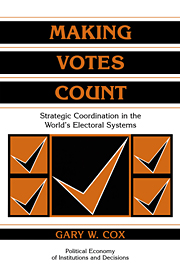Book contents
- Frontmatter
- Contents
- List of tables and figures
- Series Editors' Preface
- Preface
- PART I INTRODUCTION
- PART II STRATEGIC VOTING
- PART III STRATEGIC ENTRY
- 8 Strategic voting, party labels, and entry
- 9 Rational entry and the conservation of disproportionality: evidence from Japan
- PART IV ELECTORAL COORDINATION AT THE SYSTEM LEVEL
- PART V COORDINATION FAILURES AND DEMOCRATIC PERFORMANCE
- PART VI CONCLUSION
- APPENDICES
- References
- Subject Index
- Author Index
8 - Strategic voting, party labels, and entry
Published online by Cambridge University Press: 05 August 2012
- Frontmatter
- Contents
- List of tables and figures
- Series Editors' Preface
- Preface
- PART I INTRODUCTION
- PART II STRATEGIC VOTING
- PART III STRATEGIC ENTRY
- 8 Strategic voting, party labels, and entry
- 9 Rational entry and the conservation of disproportionality: evidence from Japan
- PART IV ELECTORAL COORDINATION AT THE SYSTEM LEVEL
- PART V COORDINATION FAILURES AND DEMOCRATIC PERFORMANCE
- PART VI CONCLUSION
- APPENDICES
- References
- Subject Index
- Author Index
Summary
Part II of this book investigated the nature and incidence of strategic voting in a variety of electoral systems, with particular emphasis on strategic desertion of weak candidates and lists. Duverger, and many after him, have argued that elite anticipation of strategic voting should lead to prudent withdrawals and hence a reduction in the number of competitors entering the field of battle. In particular, those elites who foresee that their own candidates or lists will bear the brunt of strategic desertion are likely to decide that mounting a (hopeless) campaign is not worth the cost, and seek instead to throw their support behind more viable candidates or lists (presumably for a price). To the extent that withdrawals of this sort do occur, the number of competitors will of course decrease.
In this chapter, I note that this argument about prudent withdrawals is theoretically limited in some of the same ways that the Duvergerian argument about strategic voting is limited. First, the argument presupposes that it will be clear at the time at which entry decisions must be made which candidate(s) or list(s) are doomed to be perceived as nonviable on the day of the election, hence shunned by instrumentally rational voters. So, just as voters must have consistent beliefs (“rational expectations”) about who is trailing, elites must have consistent beliefs about who will be trailing and hence be the victim of strategic voting.
Information
- Type
- Chapter
- Information
- Making Votes CountStrategic Coordination in the World's Electoral Systems, pp. 151 - 172Publisher: Cambridge University PressPrint publication year: 1997
Accessibility standard: Unknown
Why this information is here
This section outlines the accessibility features of this content - including support for screen readers, full keyboard navigation and high-contrast display options. This may not be relevant for you.Accessibility Information
- 1
- Cited by
